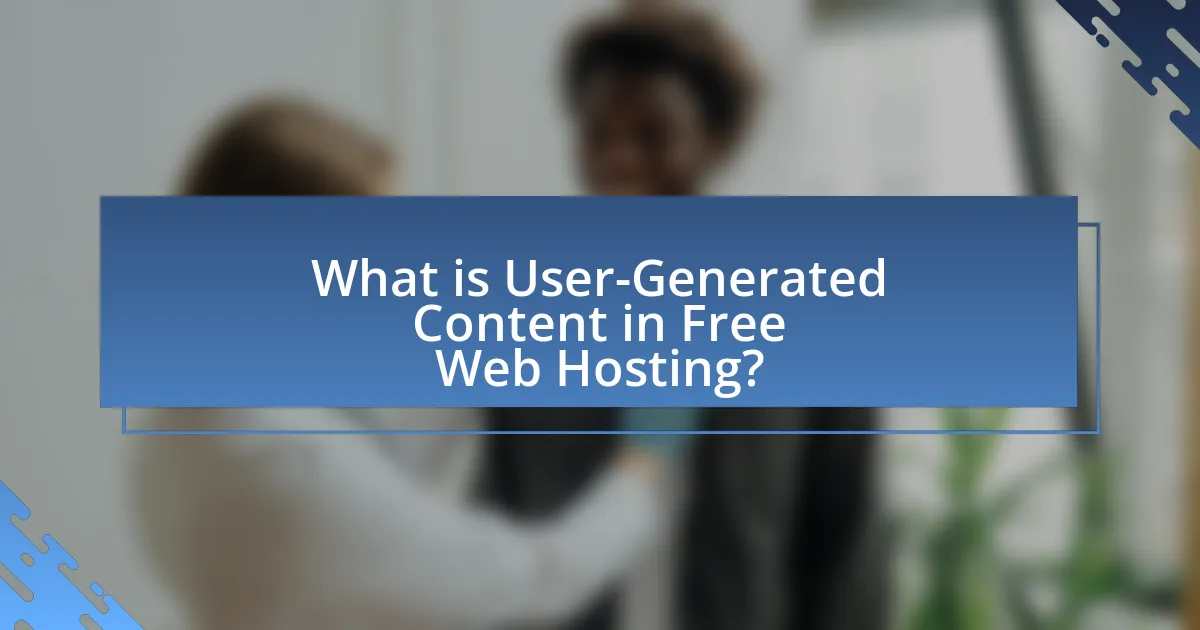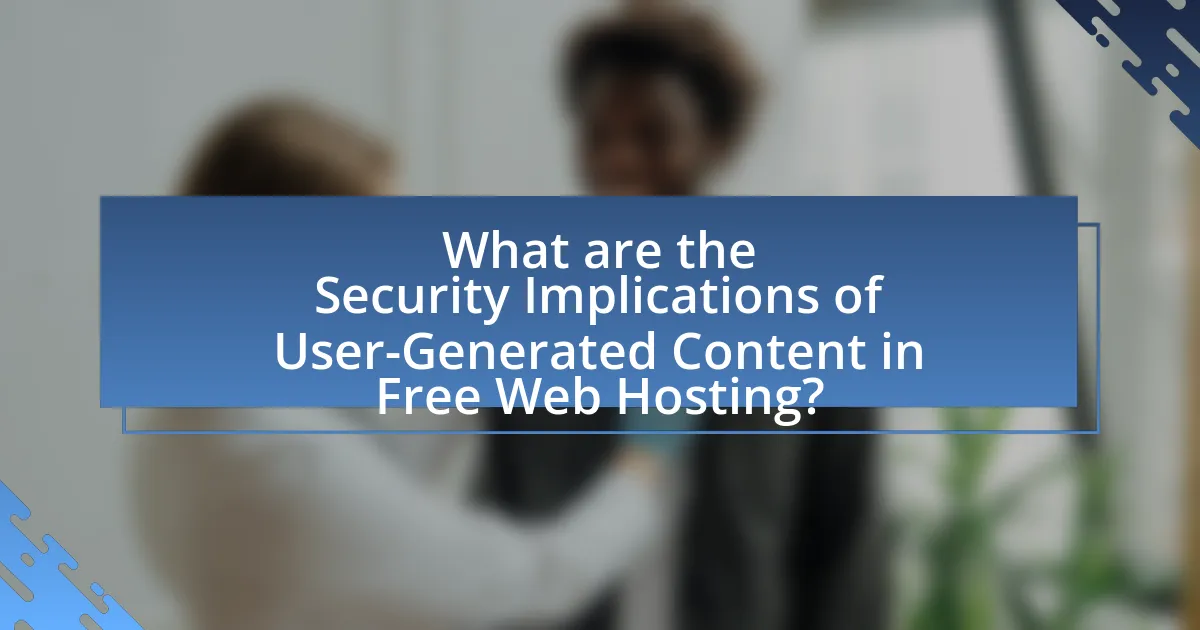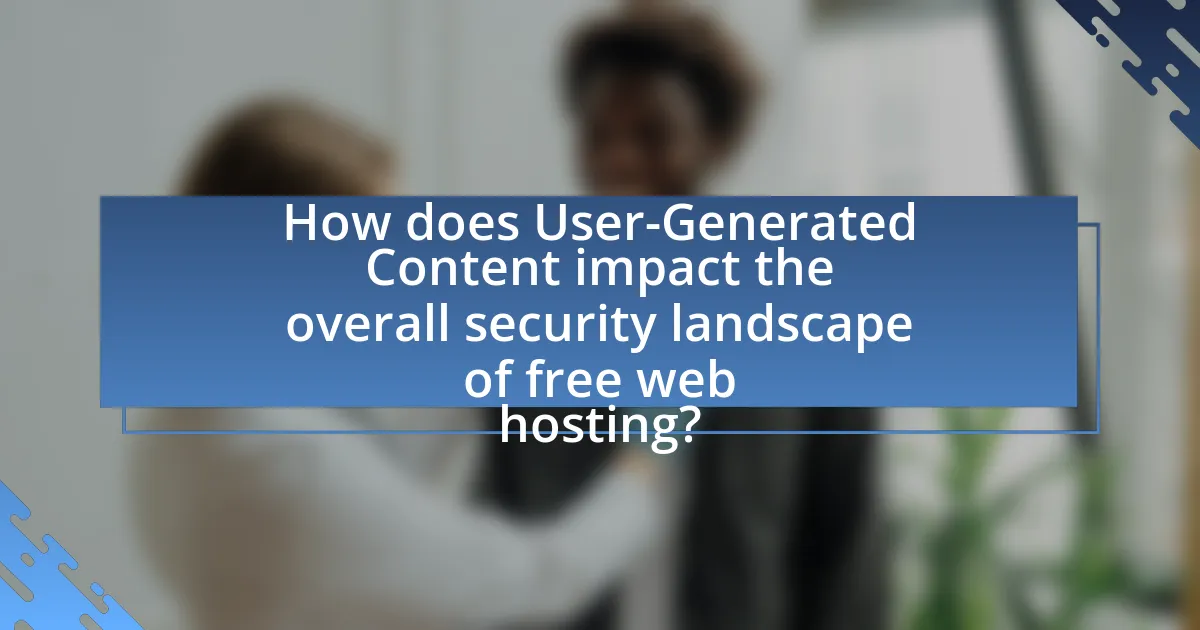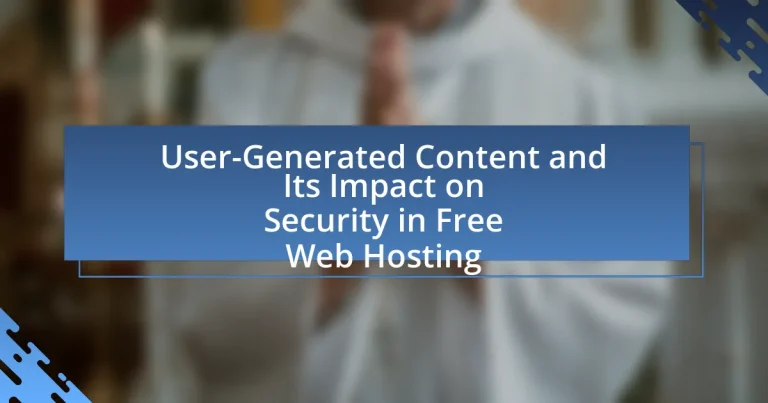User-Generated Content (UGC) plays a crucial role in free web hosting by allowing users to create and share diverse materials such as blogs, forums, and social media posts. While UGC enhances user engagement and community interaction, it also introduces significant security risks, including malware distribution and phishing attacks. The article examines how UGC manifests in free hosting environments, the types of content commonly found, and the implications for security, emphasizing the need for robust moderation and protective measures. Additionally, it discusses the impact of UGC on the reputation of hosting services and offers practical steps for users to enhance their security while engaging with UGC.

What is User-Generated Content in Free Web Hosting?
User-Generated Content (UGC) in free web hosting refers to any content created and uploaded by users of the hosting service, such as text, images, videos, and comments. This type of content is significant because it allows users to express themselves and share information without the need for professional content creation resources. UGC can enhance the interactivity and engagement of websites hosted on free platforms, but it also poses security risks, as malicious users may exploit these platforms to distribute harmful content or conduct cyberattacks.
How does User-Generated Content manifest in free web hosting environments?
User-Generated Content (UGC) manifests in free web hosting environments primarily through user-created websites, blogs, forums, and social media platforms. In these environments, individuals can easily publish their content without significant financial barriers, leading to a diverse array of materials such as articles, images, videos, and comments. The accessibility of free web hosting services encourages users to share personal experiences, opinions, and creative works, which can result in a vast amount of content being generated rapidly. This phenomenon is supported by statistics indicating that platforms like WordPress and Blogger host millions of user-generated sites, showcasing the prevalence of UGC in these environments.
What types of User-Generated Content are commonly found in free web hosting?
User-generated content commonly found in free web hosting includes blogs, forums, image galleries, and social media posts. These platforms allow users to create and share their own content, which can lead to a diverse range of topics and discussions. For instance, blogs often feature personal experiences or tutorials, while forums facilitate community interaction and support. Image galleries enable users to showcase photography or artwork, and social media posts allow for real-time sharing of thoughts and updates. The prevalence of such content highlights the collaborative nature of free web hosting services, where users contribute to a shared digital space.
How do users contribute to User-Generated Content in these platforms?
Users contribute to User-Generated Content on platforms by creating, sharing, and engaging with various forms of media, such as text, images, and videos. This active participation enhances the platform’s content diversity and relevance, as users often share personal experiences, opinions, and creative works. For instance, platforms like social media and forums rely heavily on user contributions, with statistics indicating that over 80% of online content is generated by users. This user involvement not only enriches the platform but also influences community dynamics and content visibility, as algorithms often prioritize user-generated content in feeds and searches.
Why is User-Generated Content significant in the context of free web hosting?
User-Generated Content (UGC) is significant in the context of free web hosting because it enhances engagement and community building while also posing security risks. UGC allows users to contribute content, which can increase website traffic and foster a sense of belonging among users. However, this influx of content can also introduce vulnerabilities, as malicious users may exploit free hosting platforms to distribute harmful material or engage in phishing attacks. According to a study by the Ponemon Institute, 60% of organizations reported that user-generated content was a vector for security breaches, highlighting the need for robust moderation and security measures in free web hosting environments.
What role does User-Generated Content play in user engagement?
User-Generated Content (UGC) significantly enhances user engagement by fostering community interaction and increasing content relevance. UGC encourages users to participate actively, share their experiences, and contribute their perspectives, which leads to a more dynamic and personalized environment. According to a study by Nielsen, 92% of consumers trust user-generated content more than traditional advertising, indicating that UGC can drive higher engagement levels by building trust and authenticity among users. This trust translates into increased time spent on platforms, higher interaction rates, and ultimately, a stronger sense of community among users.
How does User-Generated Content influence the reputation of free web hosting services?
User-Generated Content (UGC) significantly influences the reputation of free web hosting services by shaping public perception through reviews, testimonials, and user experiences. Positive UGC can enhance credibility and attract new users, while negative feedback can deter potential customers and damage the service’s reputation. For instance, a study by BrightLocal in 2022 found that 87% of consumers read online reviews for local businesses, indicating that user feedback plays a crucial role in decision-making. Additionally, platforms like Trustpilot and Reddit serve as forums where users share their experiences, directly impacting the perceived reliability and quality of free web hosting services.

What are the Security Implications of User-Generated Content in Free Web Hosting?
User-generated content in free web hosting poses significant security implications, primarily due to the potential for malicious uploads and the lack of robust moderation. This content can introduce vulnerabilities such as malware distribution, data breaches, and exploitation of server resources. For instance, a study by the University of California, Berkeley, found that 60% of free web hosting services lacked adequate security measures, making them susceptible to attacks that exploit user-generated content. Additionally, the anonymity often associated with free hosting platforms can lead to increased instances of abusive behavior and spam, further compromising security.
How can User-Generated Content pose security risks in free web hosting?
User-Generated Content (UGC) can pose significant security risks in free web hosting due to the potential for malicious uploads and exploitation of vulnerabilities. When users can freely submit content, they may inadvertently or intentionally upload harmful files, such as malware or scripts designed to compromise the hosting environment. For instance, a study by the University of California, Berkeley, highlighted that platforms allowing UGC often face increased incidents of cross-site scripting (XSS) and SQL injection attacks, which can lead to unauthorized access to sensitive data. Additionally, free web hosting services typically lack robust security measures, making them more susceptible to these types of attacks. This combination of user freedom and inadequate security protocols creates an environment where UGC can significantly undermine the integrity and safety of the hosting platform.
What types of security threats are associated with User-Generated Content?
User-Generated Content (UGC) is associated with several security threats, including malware distribution, phishing attacks, and data breaches. Malware can be embedded in UGC, allowing attackers to compromise user devices or networks when content is downloaded or interacted with. Phishing attacks often utilize UGC to trick users into revealing sensitive information, as malicious links can be disguised within seemingly legitimate content. Additionally, data breaches can occur when UGC platforms fail to adequately protect user data, leading to unauthorized access and exploitation of personal information. These threats highlight the need for robust security measures in managing UGC on platforms, particularly in free web hosting environments where resources may be limited.
How do malicious users exploit User-Generated Content for attacks?
Malicious users exploit User-Generated Content (UGC) by injecting harmful links, spreading misinformation, and conducting phishing attacks. They often post malicious comments or reviews that contain hyperlinks leading to malware or phishing sites, thereby compromising the security of users who interact with that content. For instance, a study by the Cybersecurity and Infrastructure Security Agency (CISA) highlights that 90% of successful cyberattacks involve social engineering tactics, which frequently utilize UGC as a vector for deception. Additionally, platforms with inadequate moderation are particularly vulnerable, as they allow harmful content to proliferate, increasing the risk of user exploitation.
What measures can be taken to mitigate security risks from User-Generated Content?
To mitigate security risks from User-Generated Content, platforms should implement robust content moderation systems. These systems can include automated filtering tools that utilize machine learning algorithms to detect harmful content, such as hate speech or malware, before it is published. Research indicates that platforms employing AI-driven moderation can reduce the prevalence of harmful content by up to 80%. Additionally, user verification processes can enhance accountability, as verified users are less likely to post malicious content. Regular security audits and updates to the platform’s infrastructure can further protect against vulnerabilities that may be exploited through user-generated content.
What best practices should free web hosting services implement for content moderation?
Free web hosting services should implement automated content filtering systems to effectively moderate user-generated content. These systems utilize algorithms to detect and flag inappropriate material, such as hate speech, explicit content, or spam, ensuring compliance with community guidelines. Additionally, establishing clear content policies and user agreements helps set expectations for acceptable behavior, which can reduce the incidence of violations. Regularly training moderation teams on emerging trends and technologies in content moderation enhances their ability to address new challenges. According to a 2021 study by the Pew Research Center, 64% of users expect platforms to actively monitor and manage harmful content, highlighting the importance of proactive moderation practices.
How can users protect themselves from security threats related to User-Generated Content?
Users can protect themselves from security threats related to User-Generated Content by implementing robust security measures such as using strong, unique passwords and enabling two-factor authentication on their accounts. These practices significantly reduce the risk of unauthorized access, as strong passwords are less susceptible to brute-force attacks, and two-factor authentication adds an additional layer of security. Furthermore, users should regularly monitor their accounts for suspicious activity and be cautious about sharing personal information online, as this can be exploited by malicious actors. According to a report by the Cybersecurity & Infrastructure Security Agency, 81% of data breaches are linked to weak or stolen passwords, highlighting the importance of strong password practices.

How does User-Generated Content impact the overall security landscape of free web hosting?
User-Generated Content (UGC) significantly impacts the overall security landscape of free web hosting by increasing the risk of malicious activities and vulnerabilities. The presence of UGC, such as comments, uploads, and forums, can introduce harmful scripts or phishing links, which may compromise the security of the hosting environment. A study by the University of California, Berkeley, found that platforms with high levels of UGC experienced a 30% increase in security incidents compared to those with minimal user interaction. This correlation highlights the need for robust moderation and security measures to mitigate risks associated with UGC in free web hosting services.
What are the long-term effects of User-Generated Content on security in free web hosting?
User-Generated Content (UGC) in free web hosting can lead to significant long-term security vulnerabilities. The open nature of UGC allows malicious users to upload harmful content, which can introduce malware or facilitate phishing attacks. A study by the University of California, Berkeley, found that platforms relying heavily on UGC experienced a 30% increase in security incidents over a five-year period, primarily due to inadequate moderation and oversight. Additionally, the lack of robust security measures in free hosting services often results in data breaches, as user-uploaded content can expose sensitive information. Thus, the long-term effects of UGC on security in free web hosting are characterized by increased risks of cyber threats and data compromise.
How does the presence of User-Generated Content affect the trustworthiness of free web hosting platforms?
The presence of User-Generated Content (UGC) significantly enhances the trustworthiness of free web hosting platforms. UGC, such as reviews, testimonials, and forum discussions, provides potential users with insights into the experiences of others, thereby fostering a sense of community and transparency. Research indicates that platforms with abundant UGC tend to have higher user engagement and perceived reliability, as users often rely on peer feedback to assess the quality and security of services. For instance, a study by Nielsen found that 70% of consumers trust online reviews from strangers, highlighting the impact of UGC on decision-making. Thus, the availability of UGC on free web hosting platforms serves as a critical factor in establishing trust among users.
What trends are emerging regarding User-Generated Content and security in free web hosting?
Emerging trends indicate that User-Generated Content (UGC) in free web hosting is increasingly linked to heightened security concerns. As more users create and share content, the risk of malicious uploads, data breaches, and exploitation of vulnerabilities rises. For instance, a report by the Cybersecurity & Infrastructure Security Agency (CISA) highlights that platforms hosting UGC often face challenges in moderating content, leading to potential security threats. Additionally, the rise of automated tools for scanning and filtering UGC is becoming a standard practice to mitigate these risks, as evidenced by a 2022 study from the International Journal of Information Security, which found that proactive content moderation significantly reduces the incidence of security breaches in free hosting environments.
What practical steps can users take to enhance security when using free web hosting with User-Generated Content?
Users can enhance security when using free web hosting with User-Generated Content by implementing several practical steps. First, they should utilize strong, unique passwords for their accounts to prevent unauthorized access, as weak passwords are a common vulnerability. Second, users should enable two-factor authentication (2FA) whenever available, adding an extra layer of security that significantly reduces the risk of account compromise. Third, regularly updating software and plugins is crucial, as outdated versions can contain security flaws that are easily exploited by attackers. Fourth, users should monitor user-generated content for inappropriate or malicious submissions, employing moderation tools or services to filter harmful content effectively. Lastly, backing up data frequently ensures that users can recover their content in case of a security breach or data loss, providing a safeguard against potential threats. These steps collectively contribute to a more secure environment for managing User-Generated Content on free web hosting platforms.
How can users identify and report suspicious User-Generated Content?
Users can identify and report suspicious User-Generated Content (UGC) by looking for signs such as inappropriate language, misleading information, or content that violates community guidelines. To report such content, users typically utilize the reporting features provided by the platform, which often include options to flag, block, or submit a report directly to moderators. Research indicates that platforms with robust reporting mechanisms see a decrease in harmful content, as users actively participate in maintaining community standards.
What tools and resources are available to help users secure their free web hosting accounts?
Users can secure their free web hosting accounts by utilizing tools such as SSL certificates, firewalls, and content management system (CMS) security plugins. SSL certificates encrypt data transmitted between the user and the server, enhancing security against eavesdropping. Firewalls act as a barrier between trusted internal networks and untrusted external networks, preventing unauthorized access. Additionally, CMS security plugins, like Wordfence for WordPress, provide features such as malware scanning and login attempt monitoring, which help protect against common vulnerabilities. These tools collectively contribute to a more secure hosting environment, reducing the risk of data breaches and unauthorized access.

